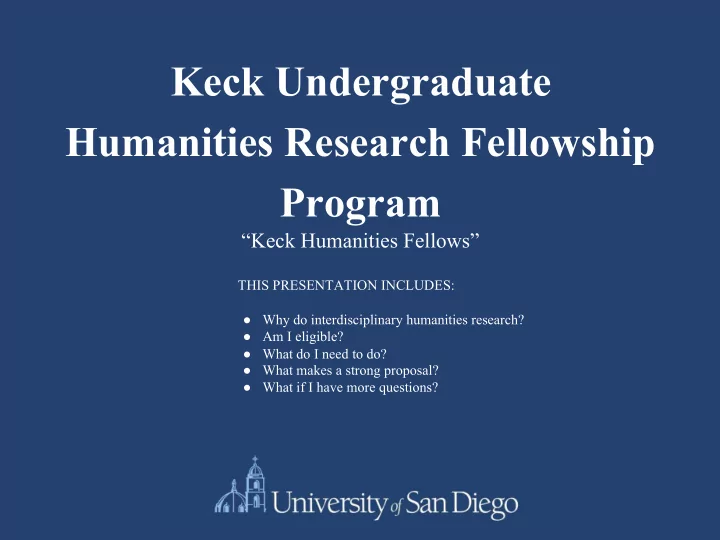

Keck Undergraduate Humanities Research Fellowship Program “Keck Humanities Fellows” THIS PRESENTATION INCLUDES: ● Why do interdisciplinary humanities research? ● Am I eligible? ● What do I need to do? ● What makes a strong proposal? ● What if I have more questions?
What is the Keck Humanities Fellowship? The Keck Humanities Fellowship is a one academic year research fellowship that provides a $2,800 stipend per semester, plus up to $1,000 to support research and up to $1,000 for conference presentation. The Fellowship is a great opportunity to gain advanced, self-directed research experience, and to help lead our humanities-engaged learning community.
Why do Interdisciplinary Humanities Research? Interdisciplinary humanities-engaged research allows you to explore the questions you have about the human condition. Collaborating with faculty gives you a rewarding experience to develop your interests, ideas, and skills.
Am I Eligible? Eligibility: ● You must be an enrolled full time USD undergraduate throughout the fellowship. ● All disciplines and academic units are welcome to apply!
What do I need to do? 1. Look at Keck Humanities Fellowship website www.sandiego.edu/cas/humanities-center/collaborative-research/keck- fellows.php 2. Identify your faculty mentor(s) 3. Write your proposal, with your mentor’s guidance 4. Submit your proposal before deadline, Friday, April 24
What makes a strong proposal? A strong proposal: ● Is complete and on time ● Has a clear research question and plan ● Centers interdisciplinary humanities ● Communicates your motivation ● Has strong faculty mentor support ● Has a doable timeline and clear budget
Who are the Keck Humanities Fellows?
2017-18 Cohort ● Katelyn Allen, Art History, “Women Printmakers in Collections and Exhibitions” ● Emily Bolender, History, “Outlaw and Order: Examining Norse Approaches to Justice and Society” ● Lia Fior, Philosophy, “Human Beings and the Drive Towards Intoxication: An Interdisciplinary Study of the Relationship of Drugs vis-a-vis the Human Condition” ● Briana Jurries, English, Yoga and American Buddhism/Hinduism Tiasha Rogers, Sociology, Agency, Education, and Deliquency ● Jesus Martinez Saucedo, Spanish, “Exhibiting Racism, Migration, and the (EU)rAfrican Borders: Socially Engaged Art and Activism in Contemporary Spain”
2018-19 Cohort ● Sophie Abber, Behavioral Neuroscience and Anthropology, “Women, Agency and Resistance: From the Salem Witch Trials to the #MeTooMovement ● Kayla Beauregard , Philosophy, “Appropriation of the Women: From Mythology to Philosophy” ● Emma Dickson, Arts and Mathematics, “Staging Science: Enhancing Scientific Communication through Theatrical Performance.” ● Rebecca Lancaster, International Business, “Executing Justice: The Influence and Response of the Catholic Church on Capital Punishment in the U.S.” ● DeZell Lathon, Theatre, “Integrating African Culture into Main Stage Theatre Through Concept of a Musical.” ● Nikta Shahbaz, Interdisciplinary Humanities, “A legal and Ethical Examination of Photorealistic Videos Created Using Artificial Neutral Networks” ● Amber Sheldon, Philosophy, “Wittgenstein and Embodied Cognition: A Critique of the Language of Thought.”
2019-20 Cohort ● Kate Burnite, Political Science, “Have We Sized Out of the Democratic Project? Designing Democratic Spaces in a World that is Too Big” ● Julia A. Gonzalez, Visual Arts & Art History, “Body Surveillance and Spectator Discomfiture: Using the Power of Painting to Investigate Women of Color’s Embodiment” ● Cooper Kent, Theology and Religious & Physics, “A Contemplative Solution to Thought Manipulation” ● Alexandra Mueller, Communication Studies, “What Sublime? Southern California Landscape in a Time of Change” ● Noah Pallmeyer , History & Communication Studies, “Official Histories and Monuments in Presidio Park and the San Diego Mission” ● Henry Tran Quevedo, Spanish & Computer Science, “Using Tech to Reveal the Fictions of Narco Cultural Productions”
What if I have more questions? ● Check the website ● Ask your faculty mentor ● Contact the Humanities Center Jesse Mills jessemills@sandiego.edu x7740 (610-260-7740)
Thank you!
Recommend
More recommend